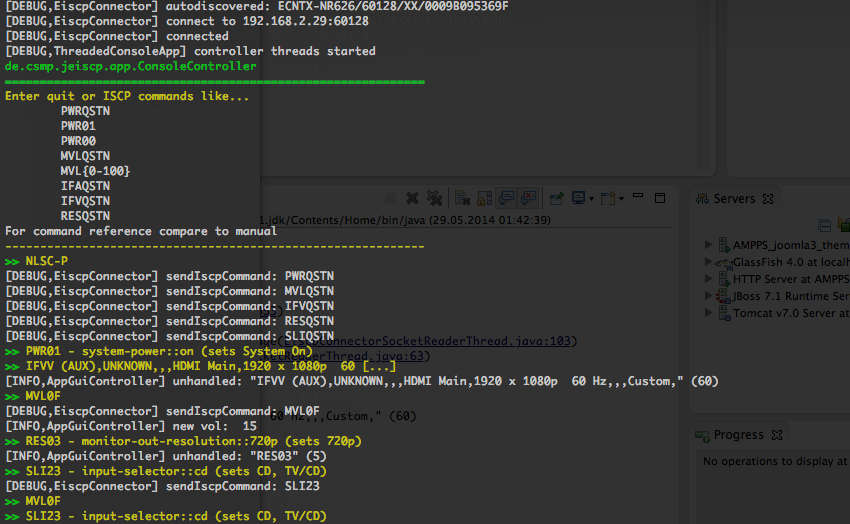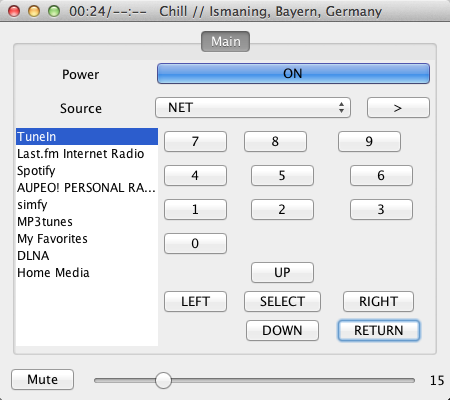jEISCP is a Java implementation of the eISCP-protocol used by various network enabled Onkyo-/Integra- AV-receivers (and other devices - but focus here is on AV-receivers). With jEISCP it is possible to control volume, source selection and so on.
ISCP (Integra Serial Control Protocol) is called the message format for serial connections to the devices. eISCP (ISCP over ethernet) is the ethernet (TCP/IP) encapsulation of ISCP - used for WLAN and LAN (default port 60128). ISCP and eISCP are described in a technical documentation maintained by Onkyo (google for "onkyo iscp technical documentation").
Console
GUI
You can use the source code "as it is" on your own risk. I´ll not be responsible for any damages to your devices/computer.
Check out the repository as usual
git clone https://github.com/cljk/jEISCP.git
and then checkout the used submodule
cd jEISCP
git submodule update --init
You need a working Maven installation to run this application.
run.bat
on Windows(TM) or
./run.sh
on nearly every other OS like Linux/OS X. To skip the autodiscovery process you can add the IP-address of your AV-receiver with the "-a" parameter like
run.bat -a 192.168.2.29
Both just call "mvn exec:java" with the main class.
After some output of maven the console will dump several log outputs like the autodiscover process... (assuming that at least one Onkyo device is available)
[DEBUG,EiscpConnector] send autodiscover datagram: !xECNQSTN
[INFO,EiscpConnector] wait for autodiscover answere
[DEBUG,EiscpConnector] answere from /192.168.2.111:60128
...
[DEBUG,EiscpConnector] autodiscovered: ECNTX-NR609/60128/XX/002719B23FAA
[DEBUG,EiscpConnector] connect to 192.168.2.111:60128
[DEBUG,EiscpConnector] connected
Then some status question commands will be sent and answeres of the receiver will be printed out (idented with >>).
[DEBUG,EiscpConnector] sendCommand: PWRQSTN
[DEBUG,EiscpConnector] sendCommand: MVLQSTN
[DEBUG,EiscpConnector] sendCommand: IFVQSTN
[DEBUG,EiscpConnector] sendCommand: RESQSTN
>> PWR00
>> IFV
>> MVL16
[DEBUG,EiscpConnector] sendCommand: MVL16
>> RES05
>> MVL16
Basically means: Asking for power status (PWRQSTN), main volume (MVLQSTN) and so on. Answere PWR00 means "power is off" and "MVL16" means "main volume is on 0x16 (hex)"
After initialization you have the possibility to enter ISCP-commands on the console - like MVL20 to change volume - and see the response. The application will build the datagram with checksum encapsulate it in EISCP and send it to the receiver.
Also a basic GUI with a volumeslider will show up.
pre-pre-pre-alpha 1.0-SNAPSHOT
Encoding/Decoding of EISCP-messages for my receiver (TX-NR609 / TX-NR626) is currently working including a simple autodiscovery mechanism.
For sure there is a lot of work to do - f.e. the application gui implementation is very basic and missing a lot of function like displaying icons, direct selection of list elements and so on.
My main focus is currently on enhancing the gui.
For (E)ISCP you can compare to the official Documentation (which this project is mainly based on). Also there are other projects with a comparable topic.
- https://github.com/miracle2k/onkyo-eiscp (Python implementation with further references). This project is also used as submodule mainly for using the YAML file describing ISCP-command-capabilities of the different receiver models (to be done).
need further thinking on that - but for now and until different is stated the source code is licenced under GPL v3


